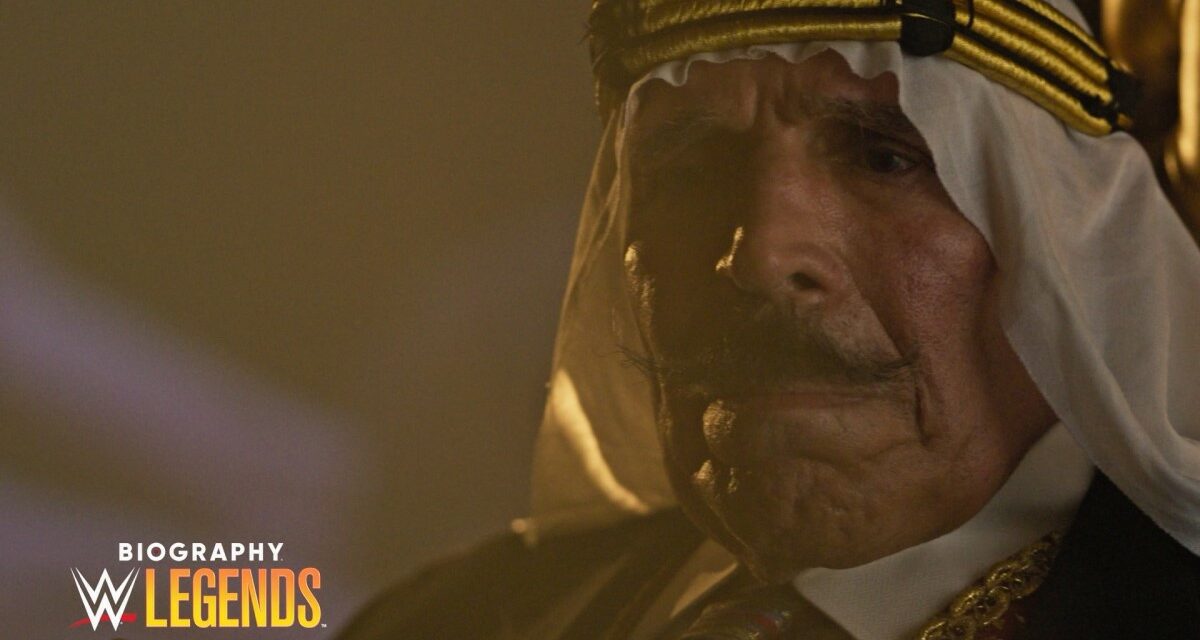Hossein Khosrow Vaziri, known for decades as The Iron Sheik, has no shortage of tales to tell. Biography gets into the good, the bad, and the tragic parts, and the Sheik himself appears to be, would you believe it, humble throughout the episode.
Keith Elliot Greenberg and The Magen brothers Jian and Page, Vaziri’s managers, take us back to the future Sheik’s youth with stories of him growing up in wrestling-proud Iran, becoming champion in the army and at the national level. He gained favour with the Shah, the leader of Iran, working for him while also becoming close with the most idolized Iranian wrestler of all, Gholamreza Takhti.
When Takhti died mysteriously after butting heads with the Shah, Vaziri saw the writing on the wall and fled to the United States. He managed to connect with Alan Rice, an American Olympic wrestler Vaziri had met during the games in 1968, who then introduced him to Verne Gagne.
Former students of Gagne’s, including his son Greg, Jim Brunzell, Sgt. Slaughter, and more, talk about the rough and tumble working conditions, but it wasn’t anything that Vaziri wasn’t up for. Brunzell said he had the skill and stamina from day one, but it did take him some time to learn the professional style.
We meet Caryl, who would become his wife, seeing pictures of a smiling Iron Sheik with his three young daughters. At first, though, he wasn’t the Iron Sheik in the ring – he was going under his own name as an immigrant hero. He was doing fine, but not doing the business he wanted. He wanted more, and talked to Gagne about turning heel. Greg remembers it was his mother who suggested the new name Iron Sheik, and once Vaziri transformed his look there was no looking back.
He lands in the WWF, with the 1979 Iranian embassy hostage crisis broadcasting footage of American hostages in Iran into homes, making Sheik an easy target for U.S. audiences to hate. He added the boots, the Camel Clutch, and was a hot commodity — and he was hated. Fans booed and threw trash at him, and he loved it all.
There are a few minutes of adulation thrown at Vince McMahon for his vision of national expansion, leading to Vaziri beating Bob Backlund for the WWF championship. Mick Foley remembers the stunning victory after Backlund had been champion for five years. Caryl was in the front row but had no idea it was coming.
Voices such as actor Anthony Azizi remember the hatred focused on Sheik at the time and the balls it took for him to go into arenas knowing there were death threats against him. With Hulk Hogan’s challenge looming, Vaziri acknowledges the story that Verne Gagne called him to offer $100,000 to shoot on Hulk and break his leg.
Well, that didn’t happen. Hogan escaped the Camel Clutch and dropped the leg to win the title. While Diamond Dallas Page acknowledges that the Sheik was the best person available to transition between Backlund and Hogan, Vaziri still makes no bones about not being pleased to drop the belt to a less-than-technically sound wrestler like Hulk.
Moving on from the title picture, Sheik worked a program with Sgt. Slaughter, turning Sarge face by virtue of declaring war on Vaziri. Sheik was a part of the Rock N’ Wrestling cartoon show, made big money through his action figure, was main eventing against Slaughter, winning tag titles with Nikolai Volkoff at the first WrestleMania, and yet he and his family are suffering the trials of the times. Vaziri is on the road more than he’s at home and is developing a drug problem with cocaine.
The other big stumble happened as rivals Jim Duggan and Vaziri rode together from the Jersey airport to get to the arena where they were due to wrestle each other in a tag match later that night. The two had drugs and liquor in the car when they’re pulled over, but it was being caught together that made headlines. Both escaped charges, but Vaziri lost his job with the WWF for a while.
Until, that is, McMahon brings him back as Colonel Mustafa, joining General Adnan and the now-Iraqi sympathizer Sgt. Slaughter. This is a very brief segment in the episode, with the SummerSlam match against Hulk Hogan and The Ultimate Warrior being the focus and Sam Roberts describing the “nuclear heat” that the angle brought.
Moving on quickly to the 90s, Vaziri teams up with Bob Backlund to co-manage The Sultan in what would be the Sheik’s last regular hurrah in the WWF. His daughters Tanya Santiago and Nikki Vaziri, who have loving memories of him as a father, also remember his binges of cocaine for days at a time.
Around this time, Vaziri’s family lost another daughter, Marissa, who was murdered by a boyfriend after she had told him their relationship was over. In these darkest of times, Vaziri was resolved to kill the boyfriend in court when his other daughters restrained him. Caryl eventually left him, which happened to inspire him to cut out the drinking and the drugs and led to them reconciling.
Vaziri had two more big moments in the WWF/E, which were winning the Gimmick Battle Royal at WrestleMania XV (and it’s noted that he won because he wouldn’t have been able to take the bump over the top rope himself), and being inducted into the Hall of Fame in 2005.
It caps off a fantastic story, one that might be pitched as a fictional tale and thought too outlandish to be true. Biography ends its season on a winning note here, presenting a hugely influential man in the company’s history whose story isn’t told by the WWE on repeat like some of the other subjects of the series, and it makes for one of the better episodes.
RELATED LINKS
- Slam Wrestling’s Iron Sheik story archive
- Slam Wrestling’s WWE on A&E archive

